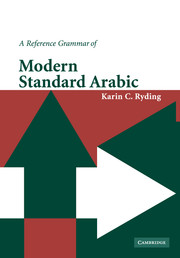Book contents
- Frontmatter
- Contents
- Preface
- List of Abbreviations
- Acknowledgments
- 1 Introduction to Arabic
- 2 Phonology and script
- 3 Arabic word structure: an overview
- 4 Basic Arabic sentence structures
- 5 Arabic noun types
- 6 Participles: active and passive
- 7 Noun inflections: gender, humanness, number, definiteness, and case
- 8 Construct phrases and nouns in apposition
- 9 Noun specifiers and quantifiers
- 10 Adjectives: function and form
- 11 Adverbs and adverbial expressions
- 12 Personal pronouns
- 13 Demonstrative pronouns
- 14 Relative pronouns and relative clauses
- 15 Numerals and numeral phrases
- 16 Prepositions and prepositional phrases
- 17 Questions and question words
- 18 Connectives and conjunctions
- 19 Subordinating conjunctions: the particle ʾinna and her sisters
- 20 Verb classes
- 21 Verb inflection: a summary
- 22 Form I: The base form triliteral verb
- 23 Form II
- 24 Form III triliteral verb
- 25 Form IV triliteral verb
- 26 Form V triliteral verb
- 27 Form VI triliteral verb
- 28 Form VII triliteral verb
- 29 Form VIII triliteral verb
- 30 Form IX triliteral verb
- 31 Form X triliteral verb
- 32 Forms XI–XV triliteral verb
- 33 Quadriliteral verbs
- 34 Moods of the verb I: indicative and subjunctive
- 35 Moods of the verb II: jussive and imperative
- 36 Verbs of being, becoming, remaining, seeming (kaan-a wa-ʿ axawaat-u-haa)
- 37 Negation and exception
- 38 Passive and passive-type expressions
- 39 Conditional and optative expressions
- Appendix I: How to use an Arabic dictionary
- Appendix II: Glossary of technical terms
- References
- Index
18 - Connectives and conjunctions
Published online by Cambridge University Press: 05 May 2012
- Frontmatter
- Contents
- Preface
- List of Abbreviations
- Acknowledgments
- 1 Introduction to Arabic
- 2 Phonology and script
- 3 Arabic word structure: an overview
- 4 Basic Arabic sentence structures
- 5 Arabic noun types
- 6 Participles: active and passive
- 7 Noun inflections: gender, humanness, number, definiteness, and case
- 8 Construct phrases and nouns in apposition
- 9 Noun specifiers and quantifiers
- 10 Adjectives: function and form
- 11 Adverbs and adverbial expressions
- 12 Personal pronouns
- 13 Demonstrative pronouns
- 14 Relative pronouns and relative clauses
- 15 Numerals and numeral phrases
- 16 Prepositions and prepositional phrases
- 17 Questions and question words
- 18 Connectives and conjunctions
- 19 Subordinating conjunctions: the particle ʾinna and her sisters
- 20 Verb classes
- 21 Verb inflection: a summary
- 22 Form I: The base form triliteral verb
- 23 Form II
- 24 Form III triliteral verb
- 25 Form IV triliteral verb
- 26 Form V triliteral verb
- 27 Form VI triliteral verb
- 28 Form VII triliteral verb
- 29 Form VIII triliteral verb
- 30 Form IX triliteral verb
- 31 Form X triliteral verb
- 32 Forms XI–XV triliteral verb
- 33 Quadriliteral verbs
- 34 Moods of the verb I: indicative and subjunctive
- 35 Moods of the verb II: jussive and imperative
- 36 Verbs of being, becoming, remaining, seeming (kaan-a wa-ʿ axawaat-u-haa)
- 37 Negation and exception
- 38 Passive and passive-type expressions
- 39 Conditional and optative expressions
- Appendix I: How to use an Arabic dictionary
- Appendix II: Glossary of technical terms
- References
- Index
Summary
Connectives – words or phrases that connect one part of discourse with another – are a pervasive feature of MSA syntax. Arabic sentences and clauses within a text are connected and interconnected by means of words or phrases (such as wa- ‘and’) that coordinate, subordinate, and otherwise link them semantically and syntactically. This frequent use of connectives results in a high degree of textual cohesion in Arabic writing that contrasts significantly with the terser style of written English. Not only are parts of Arabic sentences coordinated or subordinated in various ways, but most sentences within a text actually start with a connective word that links each sentence with the previous ones.
Even paragraphs are introduced with connectives that connect them to the text as a whole. As Al-Batal remarks: “MSA seems to have a connecting constraint that requires the writer to signal continuously to the reader, through the use of connectives, the type of link that exists between different parts of the text. This gives the connectives special importance as text-building elements and renders them essential for the reader's processing of text” (1990, 256).
Connective words that link sentences within a text are referred to as “discourse markers.” Analysis of discourse markers in English has tended to focus on spoken conversation whereas analysis of discourse markers in Arabic (Al-Batal 1990, Johnstone 1990, Kammensjö 1993) has focused particularly on the structure of written narrative.
Information
- Type
- Chapter
- Information
- A Reference Grammar of Modern Standard Arabic , pp. 407 - 421Publisher: Cambridge University PressPrint publication year: 2005
